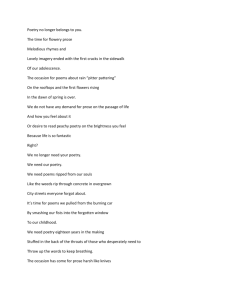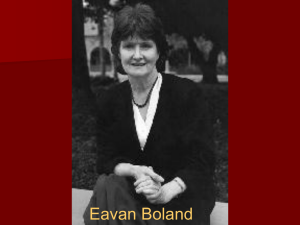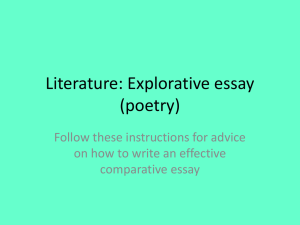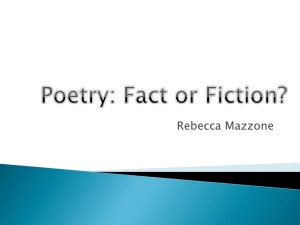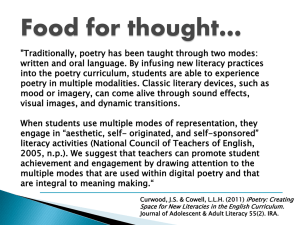ENGK-343-110-Creative Writing - Texas A&M University
advertisement
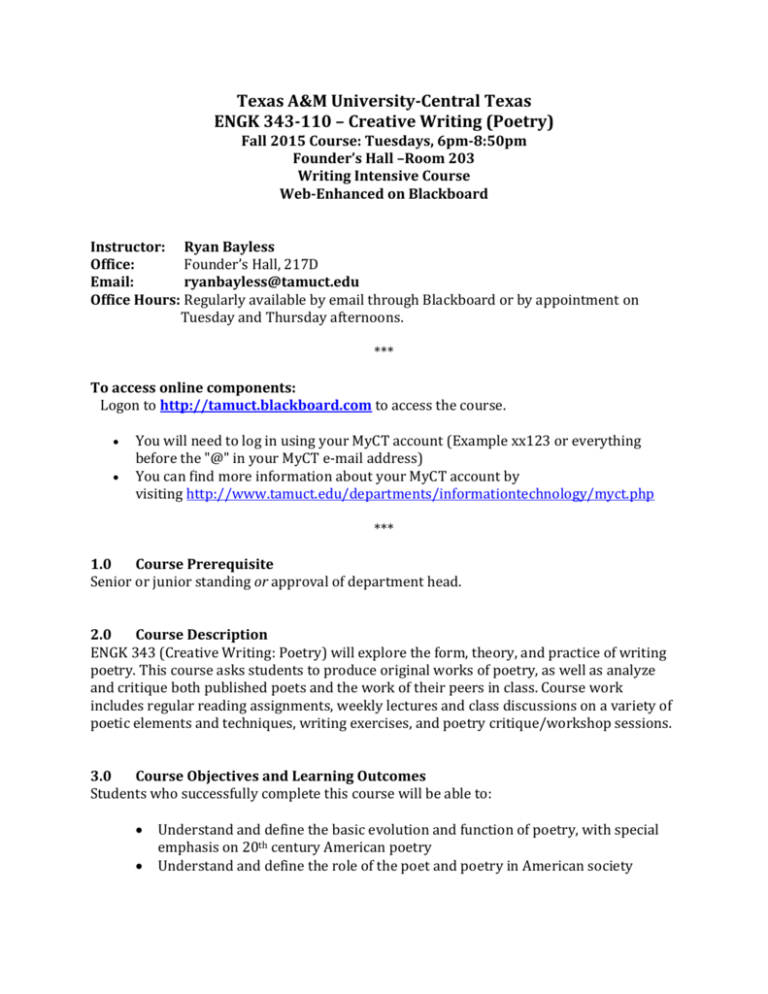
Texas A&M University-Central Texas ENGK 343-110 – Creative Writing (Poetry) Fall 2015 Course: Tuesdays, 6pm-8:50pm Founder’s Hall –Room 203 Writing Intensive Course Web-Enhanced on Blackboard Instructor: Ryan Bayless Office: Founder’s Hall, 217D Email: ryanbayless@tamuct.edu Office Hours: Regularly available by email through Blackboard or by appointment on Tuesday and Thursday afternoons. *** To access online components: Logon to http://tamuct.blackboard.com to access the course. You will need to log in using your MyCT account (Example xx123 or everything before the "@" in your MyCT e-mail address) You can find more information about your MyCT account by visiting http://www.tamuct.edu/departments/informationtechnology/myct.php *** 1.0 Course Prerequisite Senior or junior standing or approval of department head. 2.0 Course Description ENGK 343 (Creative Writing: Poetry) will explore the form, theory, and practice of writing poetry. This course asks students to produce original works of poetry, as well as analyze and critique both published poets and the work of their peers in class. Course work includes regular reading assignments, weekly lectures and class discussions on a variety of poetic elements and techniques, writing exercises, and poetry critique/workshop sessions. 3.0 Course Objectives and Learning Outcomes Students who successfully complete this course will be able to: Understand and define the basic evolution and function of poetry, with special emphasis on 20th century American poetry Understand and define the role of the poet and poetry in American society 2 Understand and define essential poetic elements such as metaphor, image, persona, narrative, and form Research and deliver a short presentation on a particular poet or writer who has influenced, affected, or inspired their own creative work along with an “imitative poem” in the style of the student’s chosen author Participate in the analysis and critique of both established poets and the poetic creations of their classmates, both through class discussions and written evaluations Produce a portfolio of five original poems Write a formal self-evaluation of one’s poetic inclinations, influences, style, inspirations, formal elements, and subject matter This class will at times deal with controversial issues and subject matter. Students should be able to tolerate innovation, viewpoints different from their own, as well as creative and cultural diversity in the arts. 4.0 Required Texts 1.) Jay Parini, Why Poetry Matters, Yale University Press, 2008. 2.) The Oxford Book of American Poetry, David Lehman, ed. Oxford University Press, 2006. This course also makes use of a number of other texts, essays, and selected poems. Links to these sources will be made available on a weekly basis through Blackboard and/or through handouts distributed in class. 5.0 Course Requirements This course has two non-gradable and four gradable categories of assignments. A discussion of each follows: Non-Gradable Requirements: Regular Reading Assignments: The reading in this course serves as a catalyst for everything we do. I have worked to keep the required reading to a minimum with the hope that students will have time to read and comprehend all that is assigned. Please be sure that you have carefully read the required assignments before class and be ready to engage in conversation and debate on the topics, themes, and issues addressed in the readings. Class Lectures: 3 Class lectures and discussions will be the primary method of instruction and learning in this course. In addition to discussing and debating the issues and themes of our weekly reading assignments, we will be constantly engaging with a variety of poems, some assigned before class, others as they merit close reading and analysis as issues are brought to light in our class discussions each week. In this way, I hope to allow the class to evolve into areas of poetics and poems that are relevant to the specific members of this class. Gradable Requirements: Participation in Class Discussions, Writing Exercises, and Workshops (25% of final grade): Students are expected to attend every class and engage regularly and often in class discussions, both on assigned readings and during poetry workshops, as well as in-class and take-home writing exercises. Grades will be determined based on attendance and the level of engagement and thoughtfulness brought to our class discussions each week, as well as the beneficial critiques of poems during workshop. (One absence will be allowed without penalty, if necessary. More than 2 absences may lower your overall final grade for the course.) Class Presentation of Poetic Influence and Imitative Poem (20% of final grade): In the first few weeks of the course, students will be asked to research and produce a 10-15 minute presentation on a particular poet or writer who has influenced, affected, or inspired their own creative work. In addition to introducing the writer’s process, persona, style, and an example of their writing to the class, each student will produce and present their own “imitative poem” that echoes or imitates the style of their chosen author. Written Critiques/Peer Review of Poems (25% of final grade): In the second half of the semester, students will submit their own poems for workshop and critique by their peers and the instructor. Students will be expected to provide informal written critiques and feedback on every poem submitted prior to our in-class workshop sessions. These written comments will be graded on the level of engagement and thoughtfulness of critiques based on the formal and thematic aspects of the poems offered by each student. Final Poetry Portfolio (30% of final grade): At the end of the semester, each student will submit a portfolio with five complete, original poems, along with a 1000-word essay that clarifies and describes how their poetic process, voice, style, form, and subject matter has evolved over the semester. 4 6.1 Grading Computation Final Grades will be calculated using the following percentages: Participation in Class Discussions, Writing Exercises, and Workshops = 25% Class Presentation of Poetic Influence and Imitative Poem = 20% Written Critiques/Peer Review of Poems = 25% Final Poetry Portfolio = 30% The distribution of final grades is as follows: Semester grade: A=90-100; B=80-89; C=70-79; D=60-69; and, F=0-59 (Borderline grades will not be automatically rounded up.) 6.2 Late-work/Make-up/Extra Credit Policy Neither late work nor make up work will exist in this class. Assignments that fail to be submitted by the deadline will not be accepted (unless you get specific approval from me for unexpected and uncontrollable extenuating circumstances that occur before the due date). Likewise, I do not assign extra credit; therefore, students should focus on providing their best work on assignments throughout the semester. 6.3 Classroom Conduct and Discussion Students should behave in the classroom as in any other professional setting or workplace. Please turn off and put away cell phones and other devices before class begins. When participating in discussion, keep in mind that the university classroom is one of the most diverse spaces within our society. Thus, you need to understand that there will be other members of the class with whom you disagree or who will disagree with you. This is fine; in fact, it is welcome. It is only through considering the beliefs and ideas of those with whom we disagree that we can truly decide on what we believe. So feel free to disagree with, refute, and/or challenge the ideas of others. However, when doing so, remain calm, polite, and respectful at all times toward your classmates, instructor, and their ideas. Anyone who shouts, engages in discrimination and/or vulgarity, or who is disrespectful in any way will be promptly dismissed and an absence will be recorded for the day. 7.1 Technology Requirements Students should have reliable access to internet in order to access additional materials and the Discussion Board on Blackboard. This course will use the TAMUCT Blackboard Learn learning management system. Logon to https://tamuct.blackboard.com to access the course. Username: Your MyCT username (xx123 or everything before the "@" in your MyCT e-mail address) 5 Initial password: Your MyCT password Check browser and computer compatibility by using the “Test Your Browser” button, found in the “Check Your Browser” module on your Blackboard dashboard, once you have logged in. 7.2 Technology Support For technology issues, students should contact Help Desk Central. 24 hours a day, 7 days a week: Email: helpdesk@tamu.edu Phone: (254) 519-5466 Web Chat: http://hdc.tamu.edu When calling for support please let your support technician know you are a TAMUCT student. For issues related to course content and requirements, contact your instructor. Technology issues are not an excuse for missing a course requirement – make sure your computer is configured correctly and address issues well in advance of deadlines. 8.0 Course Calendar Please see the course calendar, reading schedule, and assignment due dates on the final pages of the syllabus below. 9.0 Drop Policy If you discover that you need to drop this class, you must go to the Records Office and ask for the necessary paperwork. Professors cannot drop students; this is always the responsibility of the student. The record’s office will provide a deadline for which the form must be returned, completed and signed. Once you return the signed form to the records office and wait 24 hours, you must go into Warrior Web and confirm that you are no longer enrolled. Should you still be enrolled, FOLLOW-UP with the records office immediately? You are to attend class until the procedure is complete to avoid penalty for absence. Should you miss the deadline or fail to follow the procedure, you will receive an F in the course. 10.0 Academic Integrity Texas A&M University -Central Texas values the integrity of the academic enterprise and strives for the highest standards of academic conduct. A&M-Central Texas expects its students, faculty, and staff to support the adherence to high standards of personal and scholarly conduct to preserve the honor and integrity of the creative community. Academic integrity is defined as a commitment to honesty, trust, fairness, respect, and responsibility. Any deviation by students from this expectation may result in a failing grade for the assignment and potentially a failing grade for the course. 6 Academic misconduct is any act that improperly affects a true and honest evaluation of a student’s academic performance and includes, but is not limited to, cheating on an examination or other academic work, plagiarism and improper citation of sources, using another student’s work, collusion, and the abuse of resource materials. All academic misconduct concerns will be reported to the university’s Office of Student Conduct. Ignorance of the university’s standards and expectations is never an excuse to act with a lack of integrity. When in doubt on collaboration, citation, or any issue, please contact your instructor before taking a course of action. More information can be found at http://www.tamuct.edu/departments/studentconduct/academicintegrity.php Depending on the severity of a student’s act of academic dishonesty, a student found to have committed any of the above will receive nothing less than a zero on the assignment on which the infraction occurred and nothing more than expulsion from the university. A minor infraction includes but is not limited to improper citations or allusions to an outside source (one not directly assigned or approved by me before submission). A major infraction includes but is not limited to the undocumented lifting of ideas, phrases, or any text from a source that finds its inspiration some place other than the student. 11.0 Disability Support Services At Texas A&M University – Central Texas, we value an inclusive learning environment where every student has an equal chance to succeed and has the right to an education that is barrier-free. The Office of Disability Support and Access is responsible for ensuring that students with a disability enjoy equal access to the University's programs, services and activities. Some aspects of this course or the way the course is taught may present barriers to learning due to a disability. If you feel this is the case, please notify your professor as soon as possible. You are also welcome to contact the Office of Disability Support and Access at (254) 501-5831 in Warrior Hall, Suite 212. For more information, please visit their webpage at www.tamuct/disabilitysupport. Any information you provide is private and confidential and will be treated as such. 12.0 Tutoring Tutoring is available to all TAMUCT students, both on-campus and online. Subjects tutored include Accounting, Finance, Statistics, Mathematics, and Writing, and APA formatting. Tutors are available at the Tutoring Center in Warrior Hall, Room 111. Visit www.ct.tamus.edu/AcademicSupport and click "Tutoring Support" for tutor schedules and contact information. If you have questions, need to schedule a tutoring session, or if you are interested in becoming a tutor, contact Academic Support Programs at 254-5015830/5836 or by emailing Cecilia.morales@ct.tamus.edu Chat live with a tutor 24/7 for almost any subject on your computer! Tutor.com is an online tutoring platform that enables TAMUCT students to log-in and receive FREE online tutoring and writing support. This tool provides tutoring in Mathematics, Writing, Career Writing, Chemistry, Physics, Biology, Spanish, Calculus, and Statistics. To access Tutor.com, log into your Blackboard account and click "Online Tutoring." 7 13.0 Library Services The University Library provides many services in support of research across campus and at a distance. We offer over 200 electronic databases containing approximately 250,000 eBooks and 82,000 journals, in addition to the 72,000 items in our print collection, which can be mailed to students who live more than 50 miles from campus. Research guides for each subject taught at TAMUCT are available through our website to help students navigate these resources. On-campus, the library offers technology including cameras, laptops, microphones, webcams, and digital sound recorders. Research assistance from a librarian is also available twenty-four hours a day through our online chat service, and at the reference desk when the library is open. Research sessions can be scheduled for more comprehensive assistance, and may take place on Skype or inperson at the library. Assistance may cover many topics, including how to find articles in peer-reviewed journals, how to cite resources, and how to piece together research for written assignments. Our 27,000-square-foot facility on the TAMUCT main campus includes student lounges, private study rooms, group work spaces, computer labs, family areas suitable for all ages, and many other features. Services such as interlibrary loan, TexShare, binding, and laminating are available. The library frequently offers workshops, tours, readings, and other events. For more information, please visit our homepage: http://www.tamuct.edu/departments/library/index.php 14.0 UNILERT. Emergency Warning System for Texas A&M University – Central Texas UNILERT is an emergency notification service that gives TAMUCT the ability to communicate health and safety emergency information quickly via email, text message, and social media. All students are automatically enrolled in UNILERT through their myCT email account. Connect at www.TAMUCT.edu/UNILERT to change where you receive your alerts or to opt out. By staying enrolled in UNILERT, university officials can quickly pass on safety-related information, regardless of your location. * *The professor reserves the right to amend this syllabus at any time during the semester as issues or needs arise. Written addendums will be distributed should this need occur. *** 8 ENGK 343 – Creative Writing (Poetry) Course Calendar – FALL 2015 This calendar outlines the general themes and reading assignments covered in the course each week. Because we will build upon the topics and themes explored each week, the material and assignments may change or evolve as we move through the semester. I will make announcements and distribute revisions as I adapt instruction and materials to your needs. Stay tuned to Blackboard for updates on required reading of additional poems from the Oxford Book of American Poetry and/or other texts. *** Week 1 (8/25): Introduction to course; discussion of syllabus and texts; individual introductions; Why Poetry Matters; Personal Essay assigned. Week 2 (9/1): Parini, Preface and Ch.1 “Defending Poetry” (pp. ix-22); The History and Role of Poetry Poems from the Oxford Book of American Poetry: Emerson, “A Letter” (p. 27) Poe, “A Dream Within a Dream” (p.72) Whitman, “Song of Myself” (p. 84; sections I, II, III, VI and L, LI, and LII) Dickinson, “This was a Poet” (p. 169) and “Tell all the Truth” (p. 182) Eliot, “The Hollow Men” (p. 365) Frost, “Dust of Snow” (p. 227) and “Acquainted with the Night” (p. 230) Bishop, “One Art” (p. 565) Week 3 (9/8): Parini, Ch. 2 “Language” (pp. 23-42) and Ch. 4 “The Way of Metaphor” (pp. 65-77); Frost, “Education by Metaphor” (on Blackboard); Poetic Language and the Power of the Image; Personal Essay and Poem Due; Presentations assigned. Poems from The Oxford Book of American Poetry: Pound, “In a Station of the Metro” (p. 302) Frost, “Design” (p. 233) Stevens, “Thirteen Ways of Looking at a Blackbird” (255) Williams, “The Locust Tree in Flower” (p. 291) Guest, “Words” (p. 663) Wagoner, “The Words” (p. 800) Wright, “Lying in a Hammock” (p. 840) 9 Week 4 (9/15): Parini, Ch. 3 “Personal Voice” (pp. 43-63); The Act of Persona; Narrative Poetry and the Prose Poem. Poems from The Oxford Book of American Poetry: Masters, all poems (pp. 191-94) Frost, “Home Burial” (p. 219) Bukowski, “Me against the World” (p. 655) Levine, “The Return” (p. 852) Plath, “The Mirror” (p. 887) Hass, “A Story about the Body” (p. 969) Edson, “The Fall,” “Antimatter,” and “The Neighborhood Dog” (p. 913-14) Week 5 (9/22): Parini, Ch. 5 “Tradition and Originality” (pp. 79-98); Overcoming the Anxiety of Influence and the Practice of Imitation; Inspiration and the Process of Writing; Presentations of Imitative Poem. Poems from The Oxford Book of American Poetry: Stevens, “The Poems of our Climate” (p. 264) Collins, “Introduction to Poetry” (pp.953-4) and “Workshop” (pp.954-6) Week 6 (9/29): Parini, Ch. 6 “Form and Freedom” (pp. 99-114); Formal Poetry vs. “Free” Verse; Sound and Music in Poetry; Presentations, continued. Poems from The Oxford Book of American Poetry: Dylan, "Desolation Row" (p. 963) Frost, "Stopping by Woods on a Snowy Evening" (p. 228) Whitman, "A Noiseless, Patient Spider" (p.151) Creeley, "I Keep Myself to Such Measures" (p. 749) Week 7 (10/6): Parini, Ch. 7 “The Politics of Poetry” (pp. 115-132); Poems of war, politics, and relationships; Presentations, continued. Poems from The Oxford Book of American Poetry: Whitman, "Reconciliation" (p.145) Hughes, "Harlem" and "Good Morning" (pp. 472-3) Robinson Jeffers, “Shine Perishing Republic” (p.319) Allen Ginsberg, “America” (pp. 757-9) Rich, “Translations” (pp.871-2) 10 Week 8 (10/13): Parini, Ch. 8 “A Natural World” (pp. 133-154); Poems of Nature and Spirituality; Presentations, concluded. Poems from The Oxford Book of American Poetry: Emily Dickinson, "A Bird, Came Down the Walk" (p. 168) James Wright, "A Blessing" (p. 841) Gary Snyder, "Piute Creek" (p. 882) Mary Oliver, "Some Questions You Might Ask" (p. 915) Week 9 (10/20): Workshop, Round 1 Week 10 (10/27): Workshop, Round 1 Week 11 (11/3): Workshop, Conclude Round 1 Week 12 (11/10): Workshop, Round 2 Week 13 (11/17): Workshop, Round 2 Week 14 (11/24): Workshop, Conclude Round 2 Week 15 (12/1): Conclusions; Final Essay and Poetry Portfolio Due

